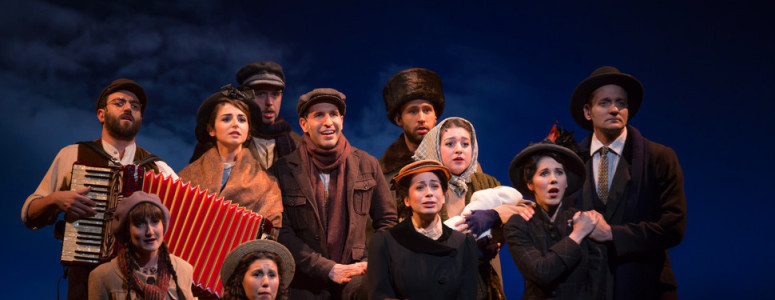Honor thy great-grandfather and great-grandmother.
You can do so by seeing AMERIKE – THE GOLDEN LAND at the National Yiddish Theatre Folksbienne.
If you’re like the vast majority of Americans, you have ancestors who once lived on another continent that was thousands of miles away from our shores.
For decades now, people have referred to flying as “the only way to travel,” but back in the late 18th and early 19th centuries, that phrase literally meant something else, for getting in the belly of a boat and staying there for weeks was “the only way to travel” to the United States.
Weren’t these emigrants brave to leave Germany, Poland, Russia, Hungary, Ukraine, Rumania and Lithuania? That’s how strong their belief was that America was “the golden land.”
“We’re going!” they exclaim at show’s start. “America is the best land for the Jews!”
(Well, yes and no …)
“It’s free of hatred and prejudice!”
(Oh, really …?)
These are the show’s early moments, when eight performers open their eyes wide to express their enthusiasm about coming to America. Their eyes will soon be wide open in another sense.
This is a revisal of THE GOLDEN LAND, a musical that Moishe Rosenfeld and Zalmen Mlotek wrote and saw produced off-Broadway in the ‘80s. This time it resides at The Museum of Jewish Heritage at Battery Place. It’s less than a mile from the Statue of Liberty, which gave the immigrants such hope when they saw it, and Ellis Island, which gave them heartbreak once they met overworked and unsympathetic inspectors. They seemed to think nothing of telling these itinerants who just got off the boat that, for one reason or another, they’d have to get back on and return home.
(A song called “Let Them In” has particular resonance now.)
Even the ones allowed to stay – whom New Yorkers unceremoniously call “greenhorns” – are soon calling America “the cursed land.” Who can blame them? They were expecting to be welcomed with open arms and were instead being treated as guilty until proven innocent. Is the “golden land” solely full of fool’s gold? What can they write home to the friends and relatives who told them not to go in the first place?
African-American writer Langston Hughes famously asked “What happens to a dream deferred?” about his own people, but it’s a line that applies to all immigrants back then – and now. The people we meet get jobs, but the bosses charge them fifty cents for the use of electricity, five cents for soap and five more for drinking water. (Is this the precursor of the “theater restoration charge?”)
Not just these issues, but nostalgia also accounts for an idealization of the old country, as the beloved song “Roumania, Roumania” extols; at times, even The Soviet Union looks good.
So now we have another show in town to remind us that immigrants get the job done. It’s everyone’s story, albeit one that is experienced by different people at different times. Eventually they are assimilated, albeit not easily.
However, just when things are finally going well for these “new Americans,” the Depression hits. Later in the show, we’re reminded that the Roosevelt administration was adamant in not admitting German Jews into the country when they were clearly, to say the least, at risk from their government.
From the minor-key opening number to the stirring finale, Bryna Wasserman has staged songs and sketches in lickety-split fashion. She’s also cast it superbly. David Perlman is the standout, for his charming smile, deft singing and sharp footwork are matched by his endearing lack of guile when he gives his name as Izzie Jacobson – and that’s his new-and-improved Americanized moniker.
The score is an amalgam of songs from the period enhanced by “modern” pieces from E.Y. Harburg and Irving Berlin. Rosenfeld and Mlotek deserve credit for making “Steam, Steam, Steam” the rediscovery of the year. Sam Lowenwirth (1880-1954) provided a snazzy melody and cleverly found three different meanings of the word.
Be aware that Yiddish is the language of choice here; just a smidgen of English is employed throughout the 90-minute intermissionless show. What’s remarkable is that for most of the performers, Yiddish is their second language; many learned it phonetically.
Excellent supertitles take care of that issue – even for those who only speak Russian. Dimitri Zisl Slepovitch has provided a translation in that language, too.
There are generous references to The Jewish Forward, the newspaper that helped the immigrants keep in touch and keep together. The audience lovingly sighed every time it came up, although they truly kvelled at a mention of radio station WEVD. That set the table for everyone’s laughing for more than a solid minute when station gave its weather report.
“Laughing for more than a minute at a weather report?” you ask in astonishment. Well, you had to be there. And you still can. AMERIKE – THE GOLDEN LAND continues, but only until August 20th. As our great-grandfathers and great-grandmothers learned a long time ago, opportunity doesn’t knock forever.




